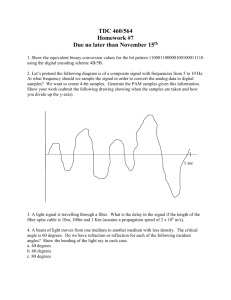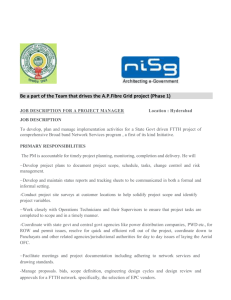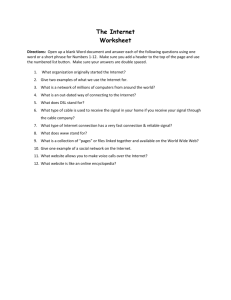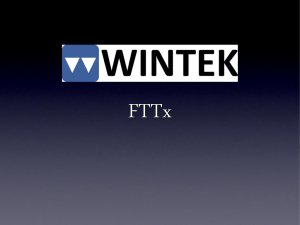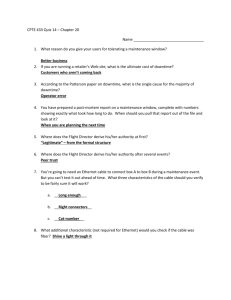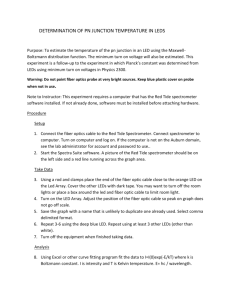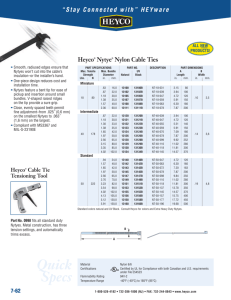Ch03
advertisement
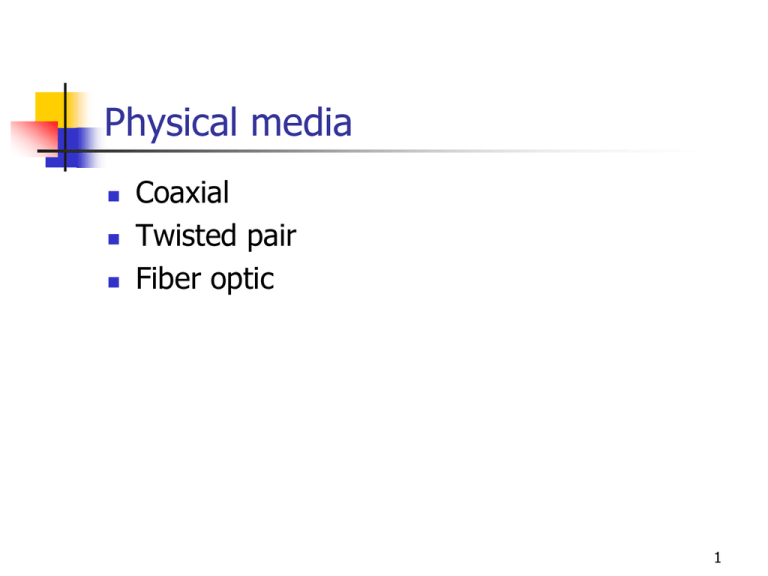
Physical media Coaxial Twisted pair Fiber optic 1 Coaxial Cable 2 Coaxial Cable Types - Bus Application Thickness Connector Type RG-8 RG-58 Thick Ethernet (500 meters) 10Base-5 0.405 inch Thin Ethernet (185 meters) 10Base-2 0.195 inch N BNC with a T-fitting 3 Other Plenum – space between floors Plenum type cable – demanded by the National Fire Protection Association that cables run within the plenum have been tested and guaranteed as save, that is, thye must be Fire retardant and create little or no smoke and poisonous gas when burned RG-59 for TV, RG-6 for TV and cable modems RG-62 for ARCnet - obsolete 4 Twisted-Pair Cable 5 UTP Cable Grades EIA/TIA Grade Applications Cat2 For voice, obsolete Category 3 (16 MHz) Voice-grade telephone networks, 10-Mbps Ethernet, 4-Mbps Token Ring, 100Base-T4 Fast Ethernet, and 100Base-VG-AnyLAN Category 4 (20 MHz) 16-Mbps Token Ring Category 5 100Base-TX Fast Ethernet, Synchronous Optical Network (SONET), and Optical Carrier (OC3) Asynchronous Transfer Mode (ATM) Category 5e and 6 1000Base-T (Gigabit Ethernet) Category 6 (250 MHz) Become standard in 2002, backbone 6 Connect s RJ-11 for phone and DSL (Digital Subscriber Link) RJ-45 for LAN, use a crimper to connect the wires to the connect first 7 Fiber Optic Cable 8 The Cores Can be glass for greater distance, or Plastic to reduce cost 9 Single Mode vs. Multimode Fiber Single mode, single-mode optical fiber (SMF) is an optical fiber designed to carry only a single ray of light (mode) Multimode fiber optic cable has a large diametral core that allows multiple modes of light to propagate http://en.wikipedia.org/wiki/Multi-mode_optical_fiber http://www.multicominc.com/active/manufacturer/multicom /Fiber%20Optics/singlemode-multimode.html 10 Multimode Fiber 11 Fiber Optic Cable Types Singlemode (SMF): Used for wide area networks (WANs) and other long cable runs, glass core, light source is transmitted from end to end and pulsed to communicate, can go up to 40 km Multimode (MMF): Used for local area networks (LANs) and short cable runs, light is reflected by cladding, core can be either glass or plastic, 1/50 the speed of SMF, 3000 ft distance 12 Pros and Cons of fiber 13 Fiber Optic Connectors (SC, ST) 14 Fiber Optic Connectors – ST and SC See page 64 (N10 – 00 5 edition) for examples of ST and SC connectors Fiber cables always need a pair – one for each direction (sending and receiving) Figure 3.8 a MT-RJ 15 Serial Cables RS-232 USB (Universal Serial Bus) can connect up to 127 devices 16 Properties of cables Transmission speed – unit Mbps Distance UTP – 100 meters Attenuation – the degradation of signal due to medium “burns” energy Duplex Noise Immunity Frequency Cat 5e can go 1Gbps for short distance Cat 6, build for 1Gbps 17 Wiring Standards 568A straight –through cable 568B Crossover cable Rolled cable Hardware loopback 18 568A straight –through cable 19 568B Crossover cable 20 Rollover – mostly CISCO 21 Loopback 22 Wiring Distributions Vertical Between floors Horizontal Within the same floor 23 Patch Panels -- inactive 24 Demarc Demarcation – last point of responsibility 25
